If you are in the market to buy a PC, then there are generally three main avenues to choose from. You can purchase the components and build the computer yourself, you can buy an off-the-shelf unit from a big box retailer, or you can go to a boutique system builder for a custom PC. If you've been in the PC community for a while, you may have heard the name Puget Systems before. They are a premium custom system builder specializing in both workstations and gaming computers. This includes workloads such as engineering, content creation, 3D modeling, ML/AI, gaming, streaming, and more.
They serve a relatively small niche market of customers looking for a premium system with the right selection of components for the job. Those customers are also willing to pay extra for build quality and a customer service team that will guide them through the entire process. There are a few competitors in this market such as Origin PC or Digital Storm on the gaming side and Velocity Micro on the workstation side, but Puget has tried to separate themselves from the competition by focusing on component selection and workload expertise.
In addition to building and selling computers, Puget does research to find the best hardware for a given workload. Maybe a certain Z370 motherboard is great for gaming, while another is better for machine learning. They'll look into which CPUs work more efficiently in Adobe Premiere, while other at less expense does great in AutoCAD. Ocassionally we've republished some of their Labs' blog content on TechSpot to complement our views on gaming and general performance, with their views on workstation-type loads.
The last time we reviewed one of Puget's systems was back in 2010, but we've stayed in touch since and earlier this year they pitched us on the idea to receive and review a new PC built by them and go through the process as one of their customers would. More than reviewing the hardware itself – which wouldn't be much of a surprise to us – we played the part of a regular customer, asking questions based on needs and also inquiring about what trends they're seeing, following on the delivery and final product that arrived to our door.
In these pre-sales conversations they told us things like they find that CAD systems are fairly easy to configure because the workflow is standardized. On the other end, content creation systems can be more difficult since the workflows vary depending on cameras, resolutions, codecs, etc. Puget told us they've seen workloads and their corresponding systems transition from heavily CPU focused to now being heavily GPU focused. Eventually we learned that Puget's core customers today are in the content creation space with some large customers doing AI / ML work as well.
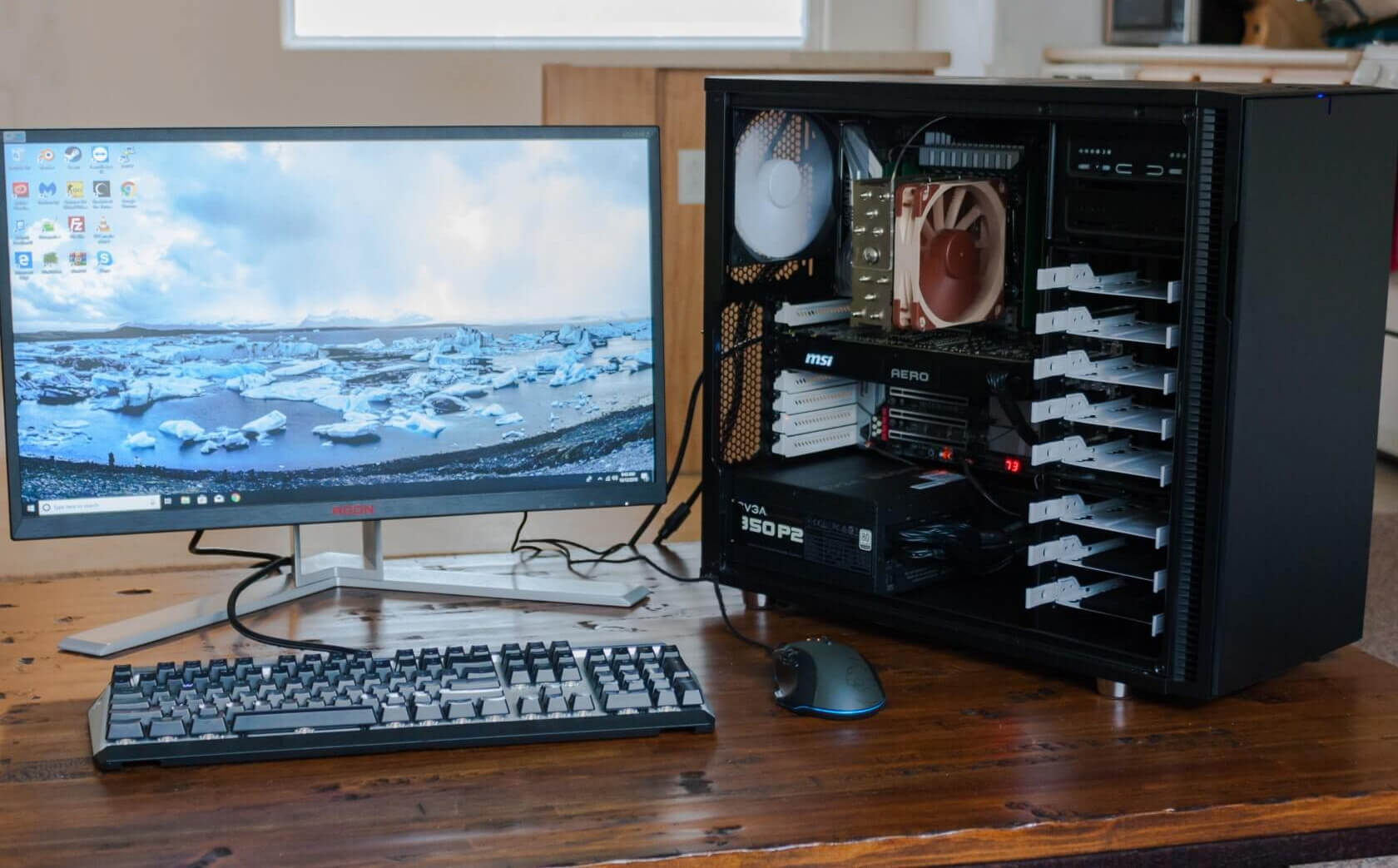
If you have a particular workload and know what type of system you want, you can start your custom build based around one of their eight different chassis types or pick one of their pre-configured systems with optimized components for your use case.
Our process began back in July 2018, so if some of the components look as they weren't picked yesterday, that's because they weren't. The system they designed for me is a "content creation by day, gaming by night" system.
After browsing their site, I had some ideas in mind, but wasn't exactly sure what type of configuration to get. To get the design process started, Puget scheduled a call with a member of their sales team. The rep walked me through the process of component selection based on my use case and felt he was knowledgeable about which components were best for different scenarios. I've specced out and built countless systems before but it was nice to sit back and see how they do. We went with the Puget Genesis 1 model and this is the system we came up with together.
| CPU | Intel Core i7 7820X |
| Motherboard | Gigabyte X299 Designare EX |
| GPU | GTX 1070 Ti 8GB |
| RAM | 32GB Crucial DDR4 2666MHz |
| Storage | 2x Samsung 860 Pro 512GB SATA SSD |
| PSU | EVGA SuperNOVA 850W P2 |
| Case | Fractal Design Define R5 Black |
| Cooling | Noctua NH-U12DX i4 |
| OS | Windows 10 Pro 64-bit |
| Total Price | $3725.30 |
The system was roughly the same price a few months ago than you can find it for now, but the Fractal case has been upgraded to the Define R6 model. As you would expect from a custom PC builder, each system is entirely customizable. Puget has a few base platforms that they recommend, but you can change each component to fit your needs.
With the final components chosen, Puget started the building process. We've seen many examples of boutique PC builders keeping you posted on the status of your system, but few as detailed as we saw here. For my build, there were 17 pages of notes on everything from who plugged in the RAM, to who verified the rear fan was screwed in, who checked the sound output, who created the shipping label, and so on...
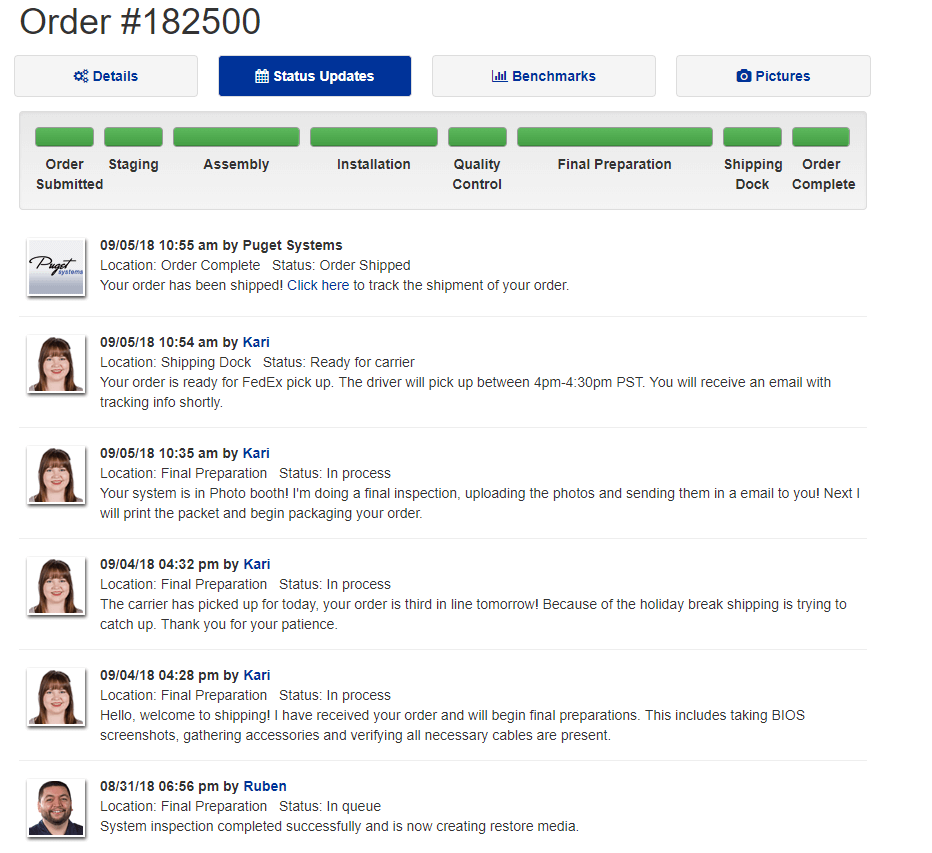
Puget also benchmarks all new builds based on the client's workload to ensure it will perform up to my expectations. All of these results are available online and linked to my account so if something doesn't seem right in the future, I can go back and check to see what the performance should be. Puget also takes photos of the system and its internals, thermal images of the components, and screenshots of BIOS settings which can work to your advantage for future reference or troubleshooting.
With all of that done, the system shipped out and arrived double-boxed to my door...
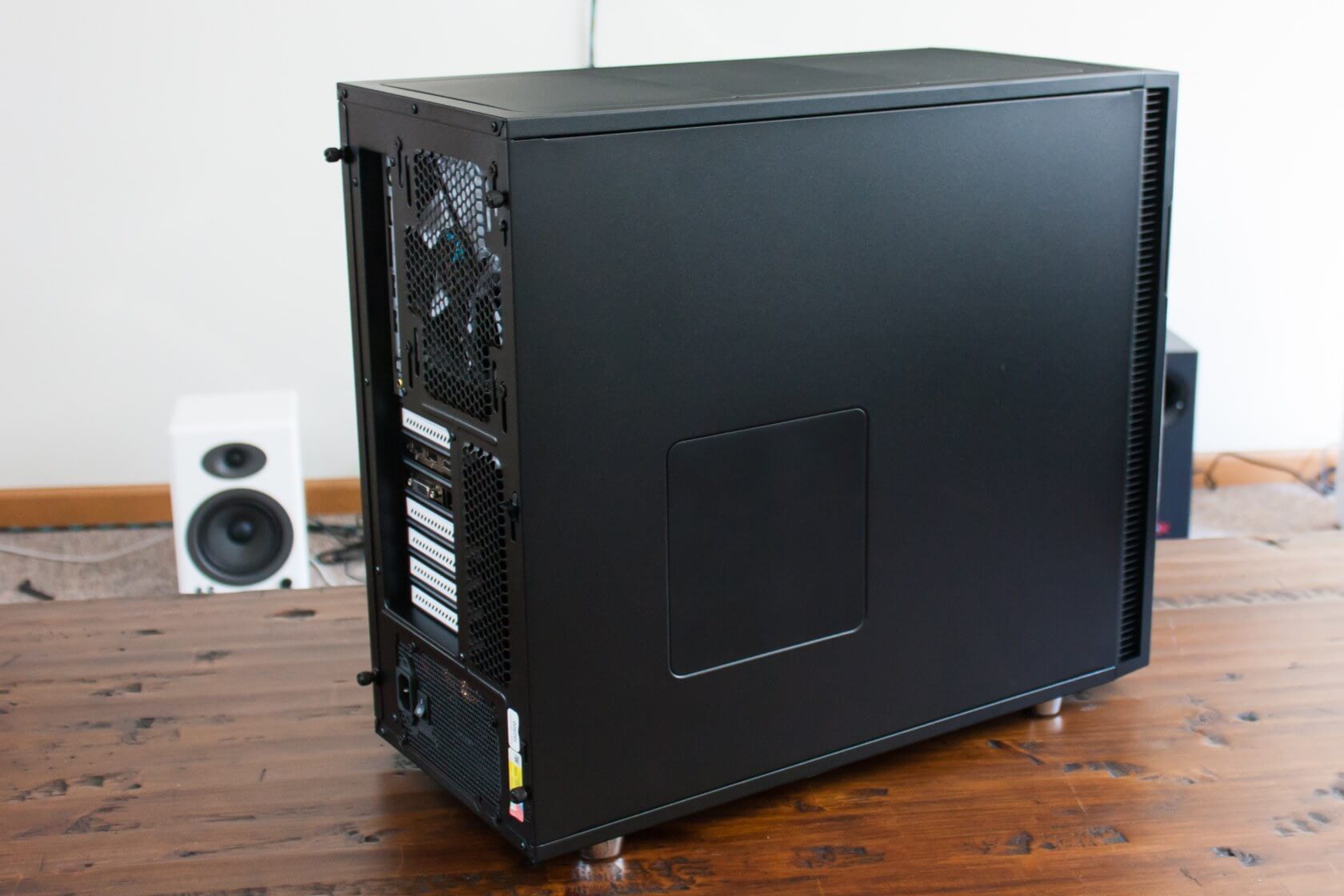
The Genesis I system is a great choice for a professional workstation. The Fractal Design Define R5 has plenty of room for high-end components but also has sound dampening material in the front panel and both side panels.
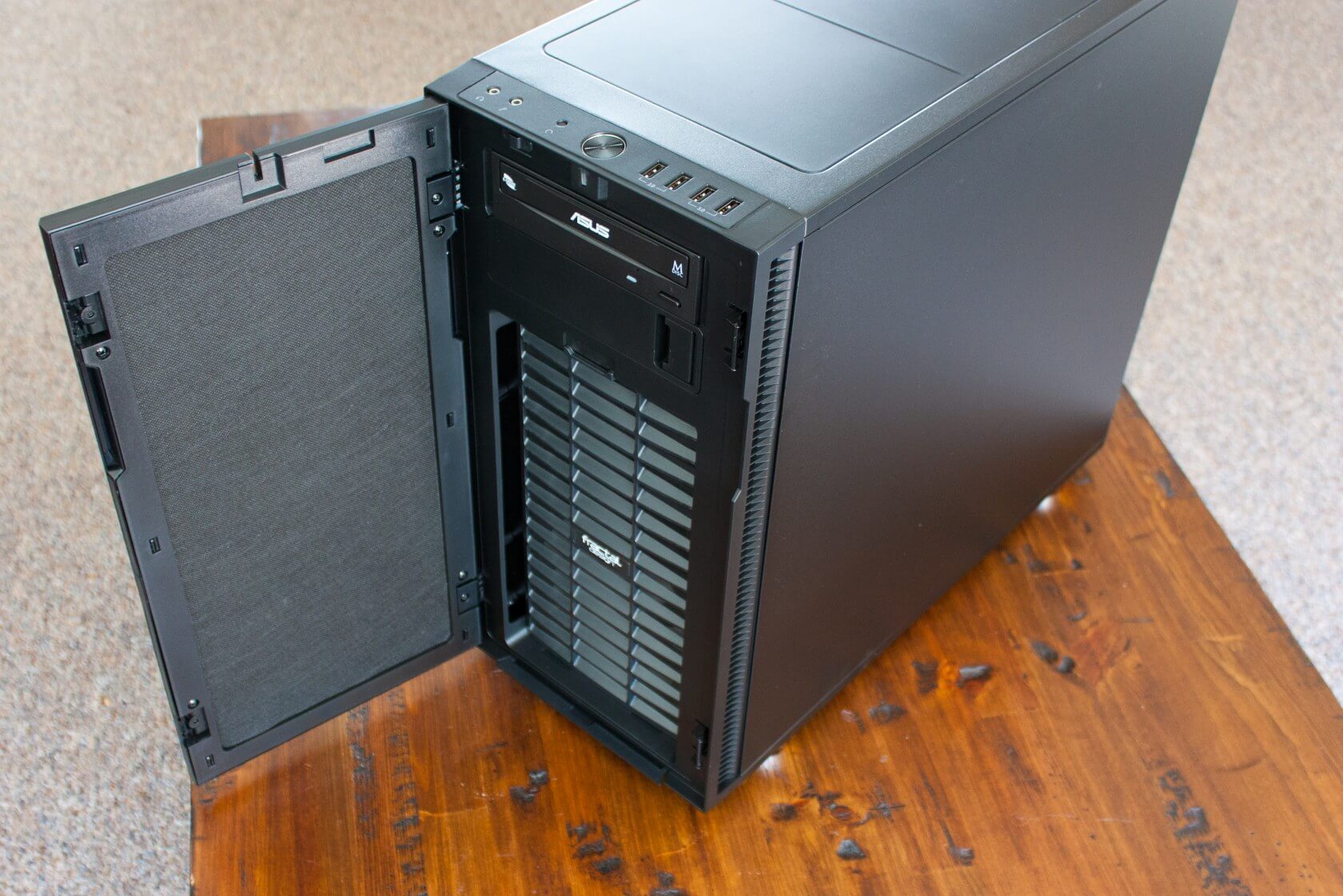
Around back we see the wide variety of I/O from the Gigabyte motherboard. The dual USB-C and dual Ethernet ports are a great feature for content creation where you may need access to multiple networks and high-speed devices. To the right of the power supply, Puget has added stickers containing information on the Windows 10 product license and an internal serial number identifying this PC to Puget.
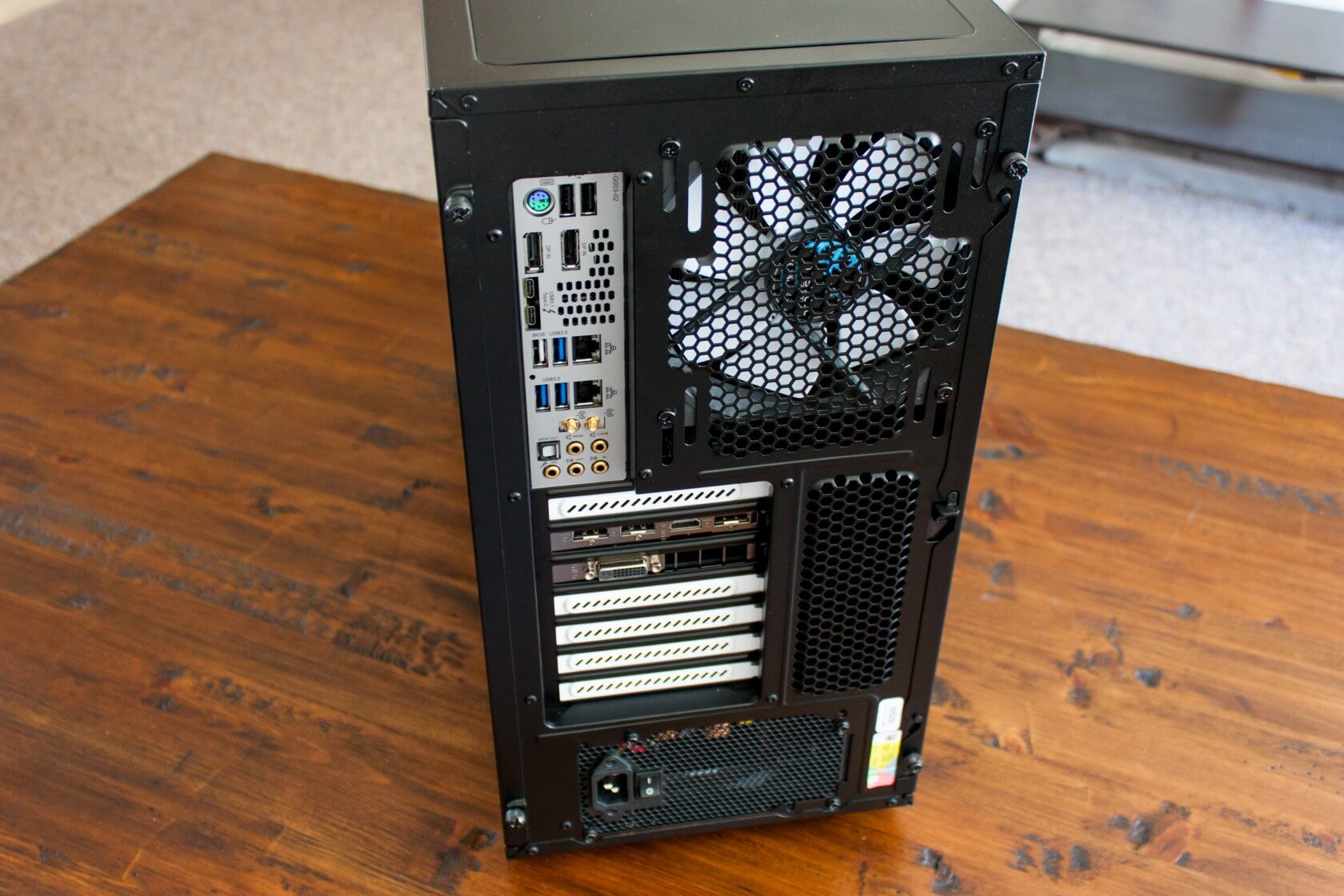
As expected, the cable management is exceptional out of the box. Every last detail has been taken care of including adding some potting compound to the front panel connectors and motherboard speaker to ensure they don't wiggle loose during shipping.
The first thing I noticed inside were the two large support pieces. Puget has custom support braces out of clear plastic to provide extra strength during shipping for both the CPU heatsink and GPU. Those two components are very heavy and are only secured at the base.
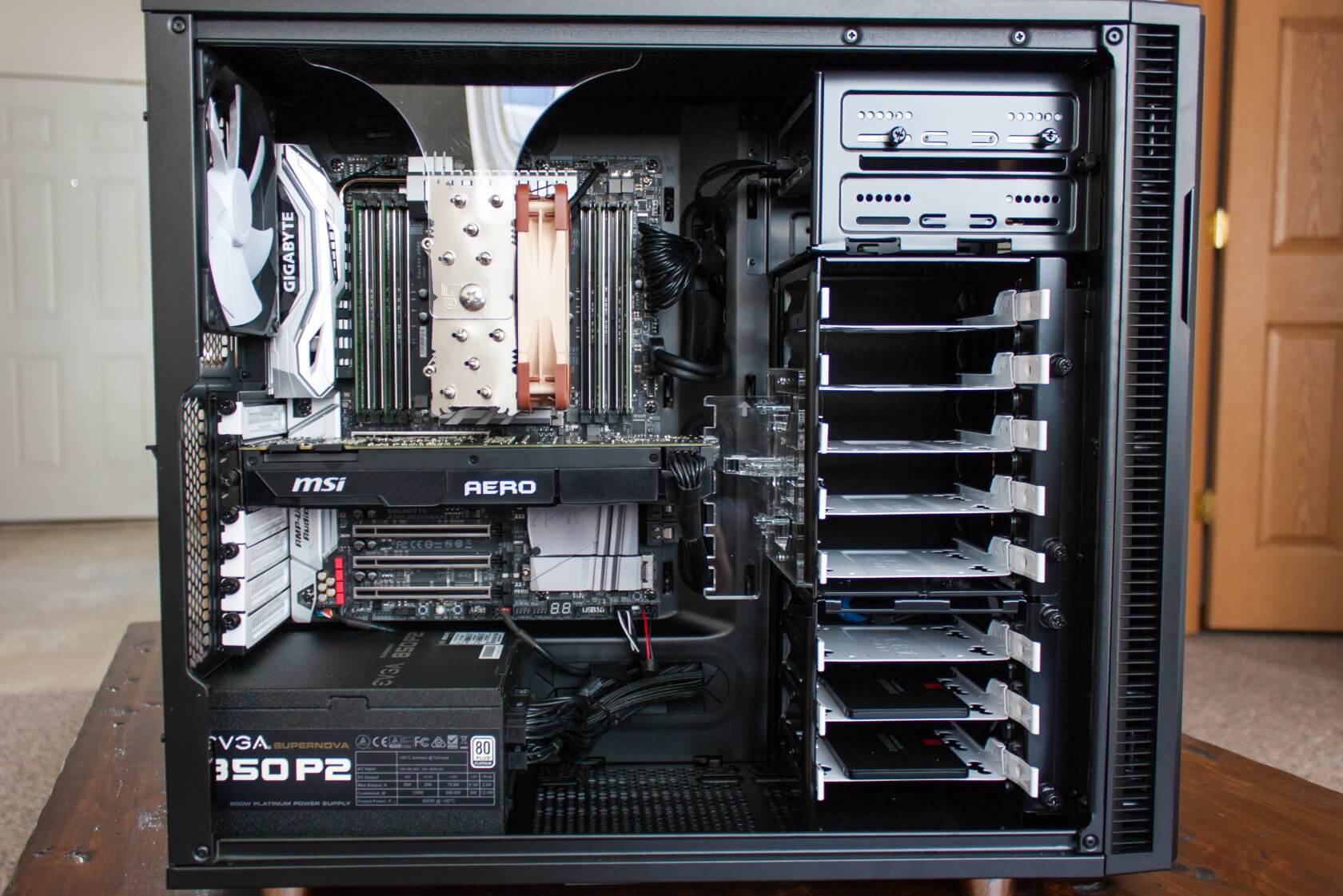
The CPU heatsink piece screws into the top of the case and fits perfectly around the individual heat pipes of the Noctua NH-U12DX i4. The GPU mount screws into the side of the hard drive bays and has support fingers for multiple GPUs. Every component in the build is customizable, but I do have two small issues with the default component choice for this build.
Everything in the system is top notch and built mostly with off the shelves components, so the fact that the RAM were plain green PCBs with no heat spreader really makes them stick out like a sore thumb. Not that it will affect performance, but if I'm spending $4,000 on a system, this looks a bit too pedestrian for my taste. The second issue I have is with the default storage options. I think in 2018 and at this price point, the storage drives should be M.2 instead of SATA. Of course, you can customize everything as you build it, but I found it strange that the system didn't come with these by default.
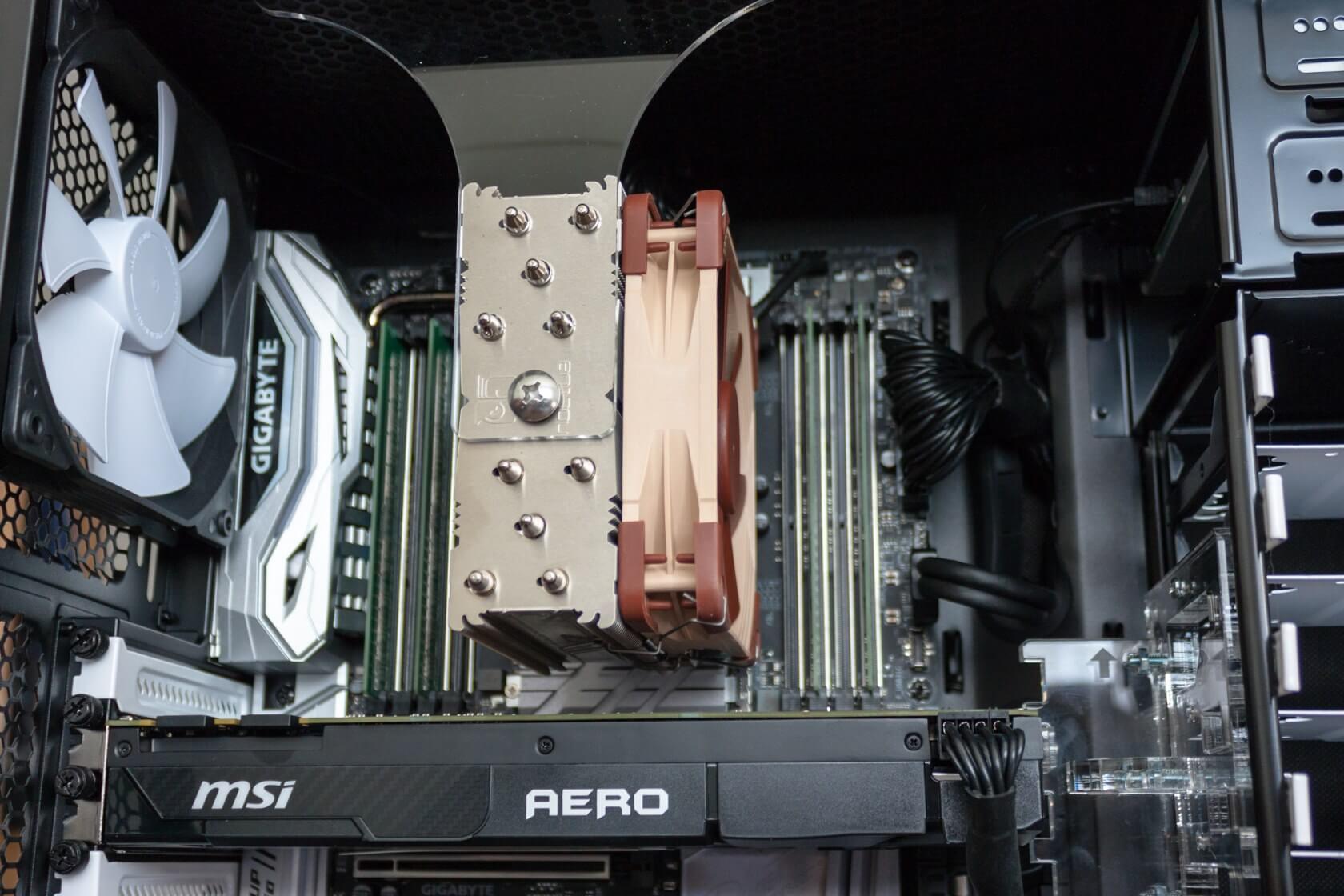
Moving around back, the excellent cable management continues. Everything is neatly managed and zip tied into place. Puget has also included an extra set of SATA data and power cables for future expansion. I thought the custom velcro with a "spare" label was a nice touch. Below the two extra hard drive mounts we find the signature of the Puget employee who built the system.
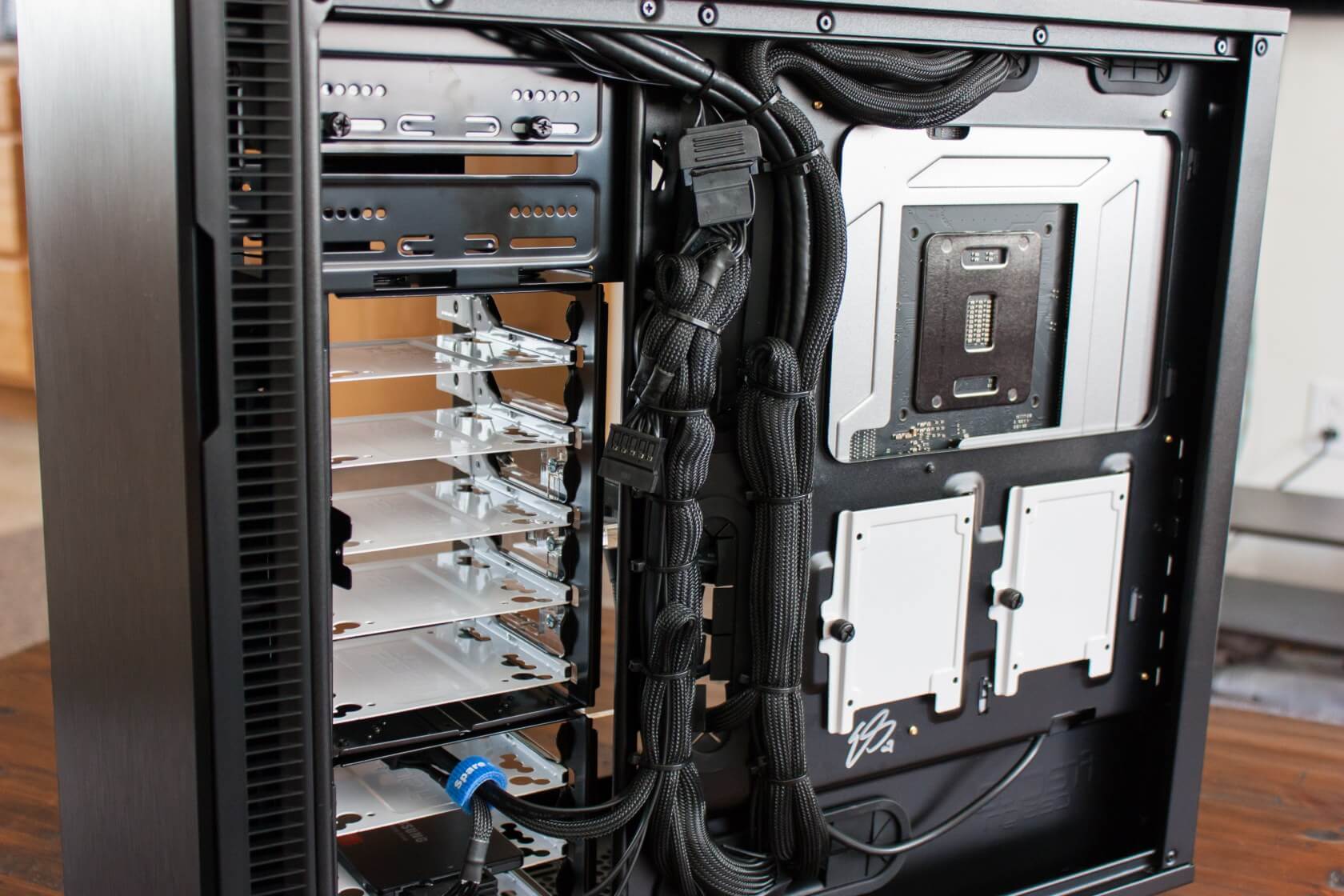
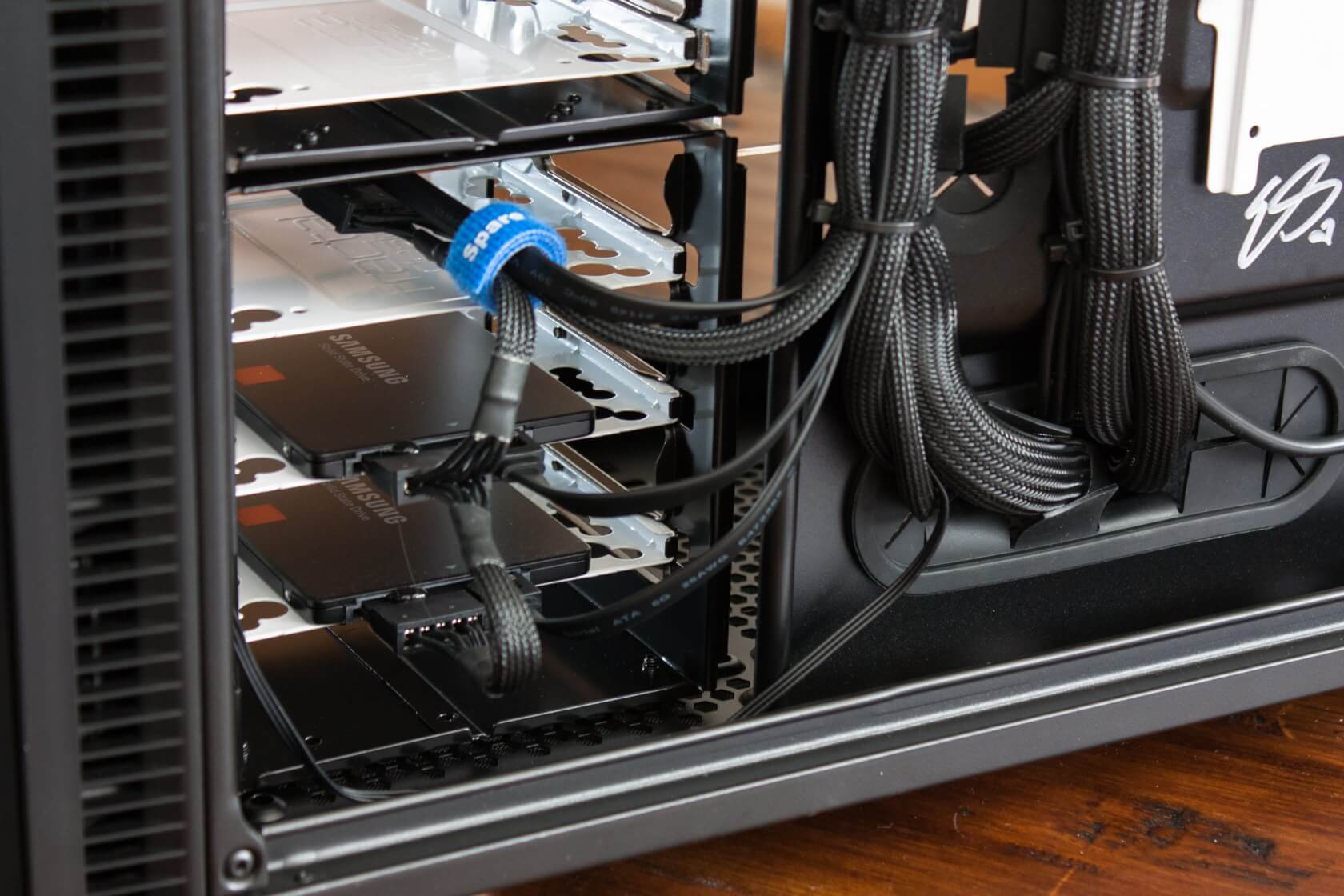
Puget includes a box of extras and a binder of system details. Power cable and video cables, Wi-Fi antennas, and more. The system's binder has a personalized note signed by the company president, detailed photos of the system including thermal imaging, a list of FAQs, several startup guides for common tasks, the full list of assembly details and benchmarks, a recovery USB drive, and optical media for Windows 10 and drivers. This is a great place to go for a paper copy of the system's details and for preliminary troubleshooting.
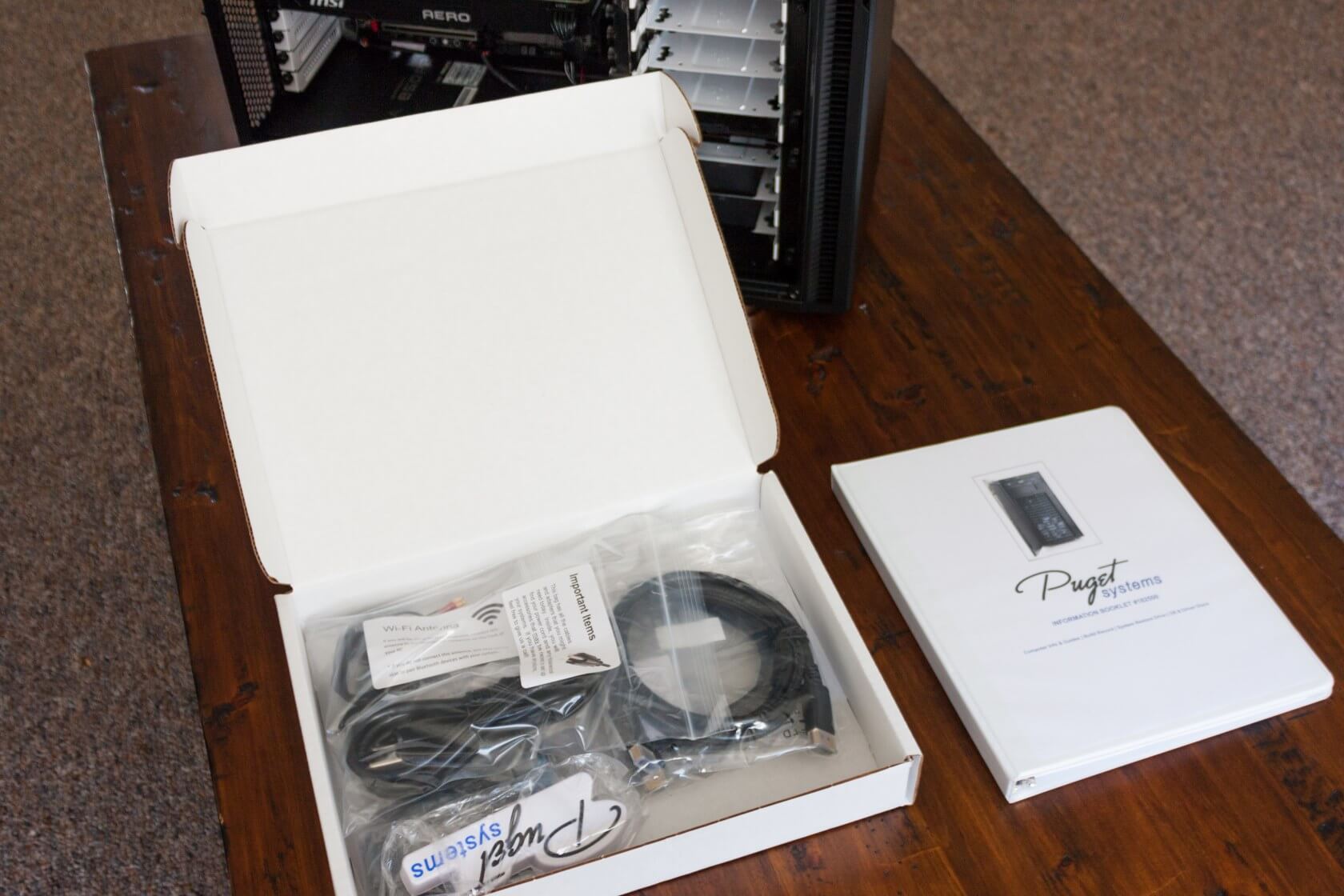
In terms of performance testing, there wasn't a whole lot to do. Puget made my job easy by running all of the benchmarks already and making the results available online. Since they use common off-the-shelf components, system performance should be very close to other systems with similar parts. Feel free to checkout our GTX 1070 Ti and Core i7-7820X reviews to get a sense of how this particular build performs.
Since this system was designed mainly for content creation, below you can see Puget's Photoshop benchmark results as an example.
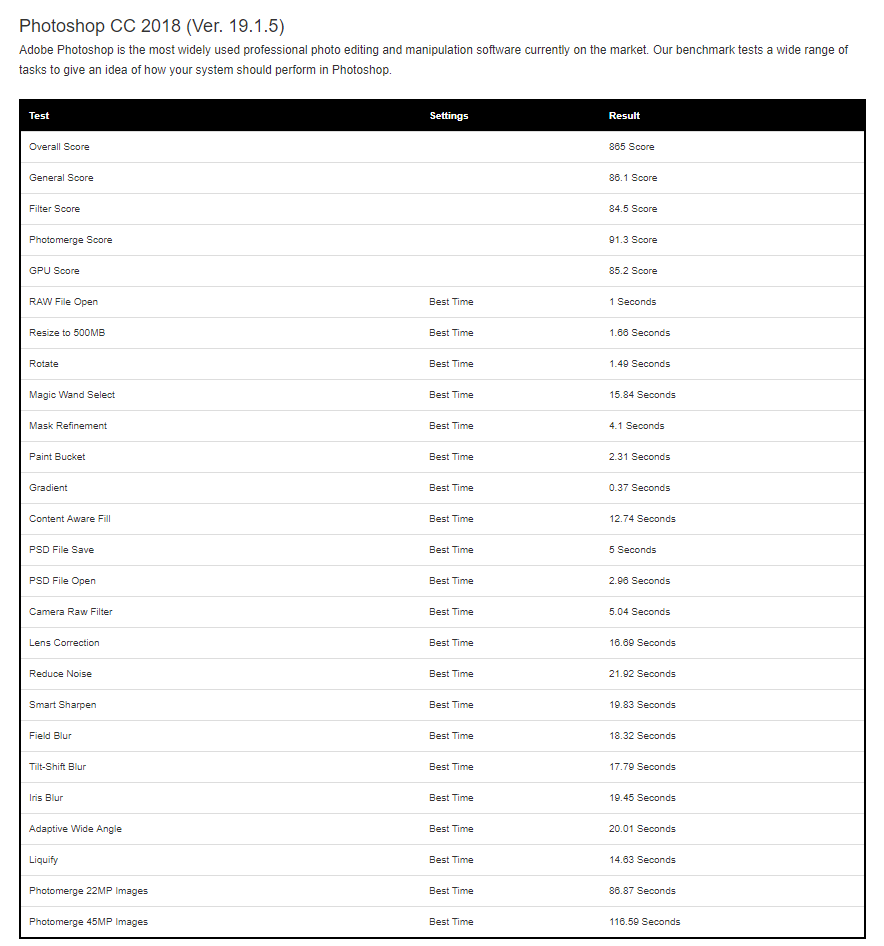
Puget says their support includes lifetime labor and technical support, with 1-year warranty on parts.
As with most boutique PC builders, value is not on their side, and certainly if you like building, upgrading and troubleshooting your own PC, you are not Puget's typical customer. If you wanted to build a similarly configured system yourself compared to the one I tested with (at the time of ordering), it would cost around $2,800 according to PCPartPicker and Newegg. What do you get for this 33% premium and who would feel comfortable spending this much?
For the average home user, this may sound way out of your ballpark. If you know exactly what computer you want, know how to build it, and don't plan on needing help with it down the road, no need to bother. But precisely for this reason, we asked Puget about their core clientele, who they are and what kind of support they often request. Choosing the best components for specific tasks came up at the top of that list, with the option to upgrade down the line at no added support cost is part of the package.
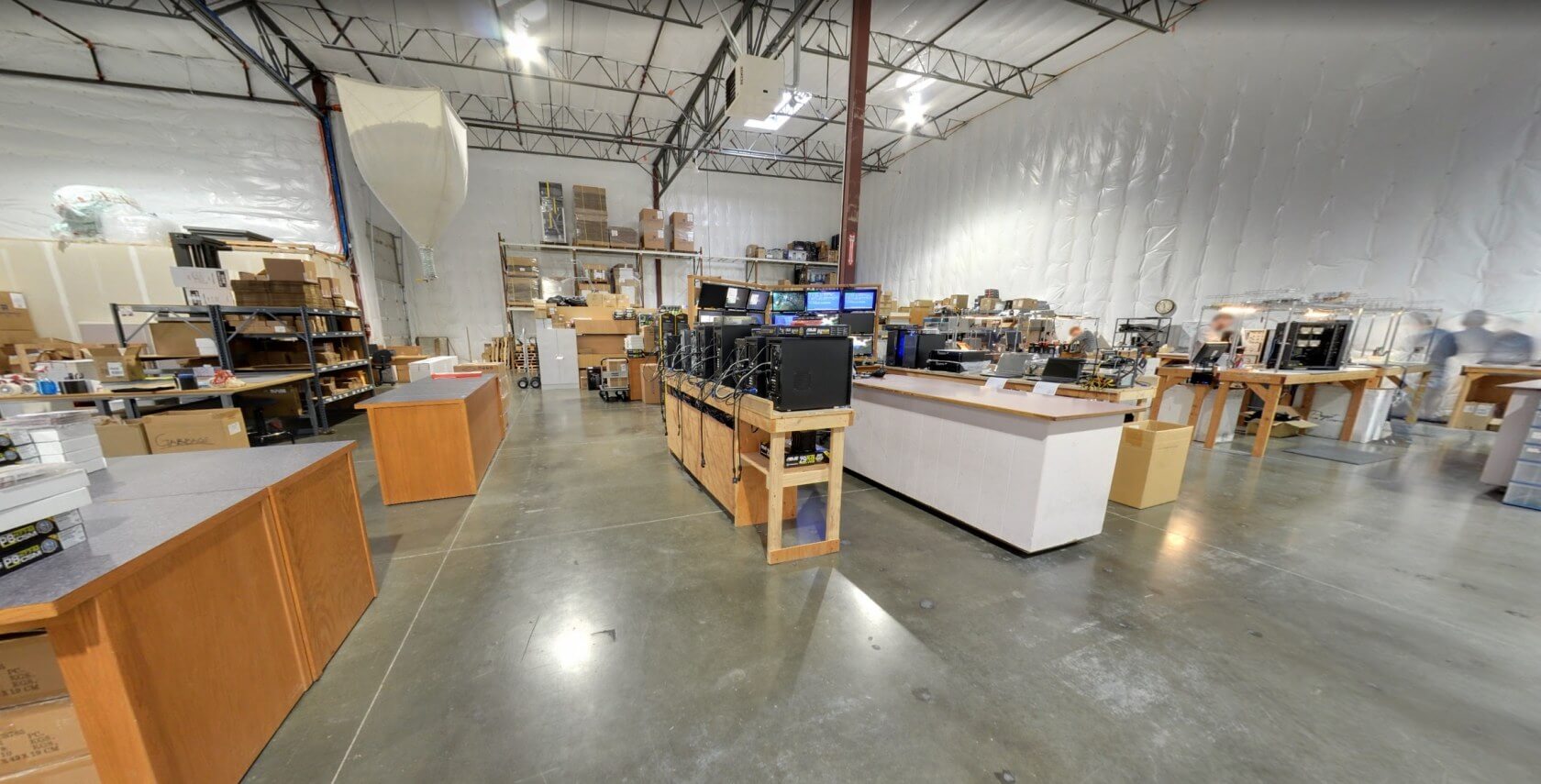
Enterprise customers that don't necessarily have the manpower to troubleshoot in-house will see Puget's support as a worthy complement. Knowing that they can spend time using the computers for their business instead of fixing them may be worth the price.
Maybe you have an idea for a machine learning startup but aren't sure what system you need to get your idea off the ground. Or if you manage a team of content creators and want to focus on art instead of the systems themselves. Puget's pitch is they can help you understand your workload and put together a system that will perfectly meet your needs.
